Top 11 Best Hardware Wallets of 2026
Our top 11:
Tangem Wallet

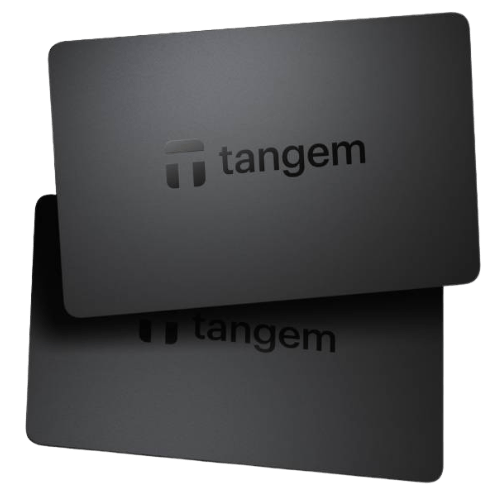
★★★★★ 9.6
- ✅ iOS and Android
- ✅ NFC wallet
- ✅ User-friendly
Ledger Flex


★★★★★ 9.6
- ✅ Touchscreen
- ✅ Cable + Bluetooth
- ✅ Incl. Recovery Key
Jade Plus

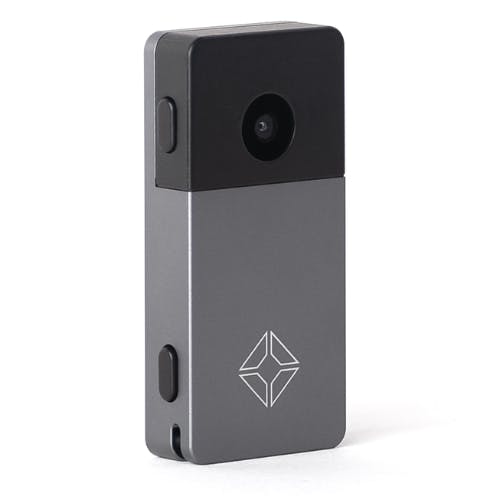
★★★★★ 8.5
- ✅ Bitcoin-only
- ✅ Open-source
- ✅ USB, Bluetooth, camera
Need a hardware wallet? On this page we compare our top 11 hardware wallets:
- Tangem Wallet – Top hardware wallet for beginners (without recovery seed backup)
- Ledger Flex – Best mid-range hardware wallet
- Ledger Nano S Plus – Best budget hardware wallet
- Ledger Nano X – Best budget iOS hardware wallet
- Trezor Safe 5 – Best alternative mid-range hardware wallet
- Ngrave Zero – Best air-gapped wallet
- Trezor Safe 3 – Best alternative budget hardware wallet
- Ledger Stax – Best premium hardware wallet
- BitBox02 – Best Bitcoin only hardware wallet
- Blockstream Jade Plus – Best Bluetooth Bitcoin only hardware wallet
- OneKey Pro – Best Touchscreen hardware wallet
1. Tangem Wallet

Where to buy Tangem Wallet?
Product details – Tangem hardware wallet
| Price | €74.95 / $69.90 |
| Brand | Tangem |
| Country | Switzerland |
| Since | 2023 |
| Computer | Not applicable |
| Mobile | Android and iOS |
| Connection | NFC with mobile |
| Cryptocurrencies | 16,000+ |
| Battery | No |
| Screen | Not applicable |
| Included |
|
Accessories
About the Tangem Wallet
The Tangem Wallet is an innovative hardware wallet in the form of a compact card that resembles a bank card. Unlike traditional hardware wallets, the Tangem does not require a screen or cables but works simply via NFC with your smartphone. This allows you to securely manage your crypto by tapping the card against your phone. All private keys are stored directly on the card and never leave it, ensuring your coins are optimally protected from hackers. The Tangem Wallet is also waterproof, durable, and ideal to carry with you, making it a reliable and user-friendly solution for anyone who wants to keep their digital assets safe.
Who is the Tangem Wallet suitable for?
The Tangem Wallet is designed for anyone who wants to manage their crypto securely and easily via their smartphone. The card works exclusively with NFC and the Tangem app on mobile phones, making use with a PC or laptop impossible. This makes the wallet especially suitable for users who prefer to manage their digital assets on the go and are looking for a robust, compact solution. Unlike traditional hardware wallets, Tangem does not use recovery seeds. Instead, the multiple physical cards in a set act as the backup: if you lose one, you can still access your funds with the remaining cards. Other backup methods are not available, which makes the usage simple but also strictly bound to this system. Therefore, the Tangem Wallet is particularly recommended for beginners who find recovery seeds intimidating or complicated.
Where to buy Tangem Wallet?
2. Ledger Flex hardware wallet

Where to buy Ledger Flex?
Product details Ledger Flex hardware wallet
| Price | 249 |
| Brand | Ledger |
| Country | France |
| Since | 2024 |
| PC/desktop | Windows, macOS and Linux |
| Mobile | Android and iOS |
| Connect with | Cable or Bluetooth |
| Coins | 5.500+ |
| Battery | Yes |
| Screen | 2,84" touchscreen of Gorilla Glass |
| Included |
|
Accessoires
About Ledger Flex hardware wallet
The Ledger Flex is Ledger's latest hardware wallet, featuring a larger, energy-efficient E-ink touchscreen and a built-in battery for mobile use. It connects via Bluetooth to smartphones or via cable to computers, supports 500+ coins through Ledger Live, and integrates with third-party apps like MetaMask. It's user-friendly, secure with EAL6+ certification, and simplifies seed phrase storage.
Who is the Ledger Flex hardware wallet suitable for?
The Ledger Flex is our favorite in the mid-range of hardware wallets. This wallet supports a large number of coins and works seamlessly with iOS, Android, Windows, macOS, and Linux devices. Although the price is slightly higher than, for example, the Nano X or Nano S Plus, this is more than compensated for by the superior user experience.
Where to buy Ledger Flex?
3. Ledger Nano S Plus hardware wallet
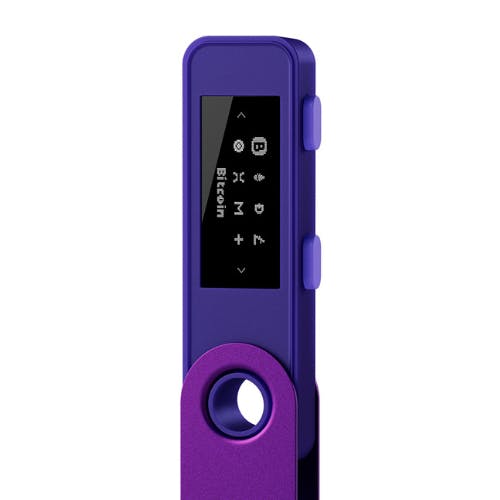
Where to buy Ledger Nano S Plus?
Product details Ledger Nano S Plus hardware wallet
| Price | 49 |
| Brand | Ledger |
| Country | France |
| Since | 2022 |
| PC/desktop | Windows, macOS and Linux |
| Mobile | Android with USB-C cable |
| Connect with | Cable |
| Coins | 5.500+ |
| Battery | No |
| Screen | 1,09" screen |
| Included |
|
Accessoires
About Ledger Nano S Plus hardware wallet
The Nano S Plus is Ledger's new hardware wallet, an improved version of the Nano S. Key improvements include a larger screen and increased memory, enabling users to install more crypto apps. The wallet supports staking of various cryptocurrencies (some directly, others through third parties) and can store over 1000 different coins and tokens. The Ledger Live app also allows for buying and selling crypto. The Nano S Plus is compatible with computers (Windows, macOS, Linux) and Android phones.
Who is the Ledger Nano S Plus hardware wallet suitable for?
New to crypto? Then the Ledger Nano S Plus is an excellent hardware wallet to start with. With this model, you can manage just as many different coins as with the more expensive options, and at a very attractive price. If you also want to use your hardware wallet with your mobile phone via Bluetooth, then the Ledger Nano X is the right choice. Do you prefer a touchscreen interface? Then the Flex is the best option.
Where to buy Ledger Nano S Plus?
4. Ledger Nano X hardware wallet

Where to buy Ledger Nano X?
Product details Ledger Nano X hardware wallet
| Price | 99 |
| Brand | Ledger |
| Country | France |
| Since | 2019 |
| PC/desktop | Windows, macOS and Linux |
| Mobile | Android and iOS |
| Connect with | Cable and Bluetooth |
| Coins | 5.500+ |
| Battery | Yes |
| Screen | 1,09" screen |
| Included |
|
Accessoires
About Ledger Nano X hardware wallet
The Ledger Nano X is a popular hardware wallet that supports a wide range of cryptocurrencies, including most major cryptocurrencies and ERC-20/BEP-20 tokens. The device features a security chip, is rechargeable, has Bluetooth connectivity, and can be used with both computers and smartphones. The Nano X allows for staking certain coins through Ledger Live, and others through external applications. Furthermore, it is compatible with DeFi protocols like MetaMask and supports the management of NFTs.
Who is the Ledger Nano X hardware wallet suitable for?
Do you want to store your crypto safely and always have it at hand on your mobile? Then the Ledger Nano X is the ideal hardware wallet for you. Like the other Ledger wallets, it supports a wide range of cryptocurrencies. However, a PC is required for firmware updates. Are you looking for an even more user-friendly wallet with a touchscreen? Then consider the Ledger Flex.
Where to buy Ledger Nano X?
5. Trezor Safe 5 hardware wallet
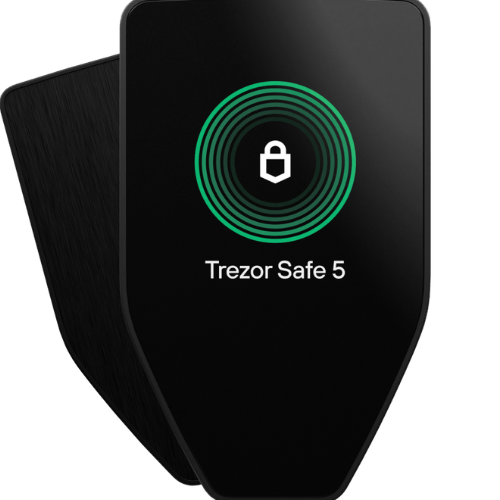
Where to buy Trezor Safe 5?
Product details Trezor Safe 5 hardware wallet
| Price | 169 |
| Brand | Trezor |
| Country | Czech Republic |
| Since | 2024 |
| PC/desktop | Windows, macOS and Linux |
| Mobile | Android |
| Connect with | Cable |
| Coins | 3.000+ |
| Battery | No |
| Screen | 1,54" Gorilla Glass Touchscreen |
| Included |
|
About Trezor Safe 5 hardware wallet
The Trezor Safe 5 is Trezor's latest hardware wallet. With the Trezor Safe 5, you can store over 1,000 different coins. The software is open-source, meaning it's visible to everyone. This enhances security because community technicians can quickly identify bugs. The Trezor Safe 5 also supports Shamir Backup. This allows you to split your seed phrase and configure it so that you need, for example, 3 out of 5 parts to access your wallet. This mitigates the risk of losing a single seed phrase backup. The screen is slightly larger and features a touchscreen, providing a clear overview and simplifying operation. You simply connect the Trezor Safe 5 via a cable.
Who is the Trezor Safe 5 hardware wallet suitable for?
The Trezor Safe 5 is a user-friendly hardware wallet with a convenient touchscreen. Open-source software ensures optimal transparency and security. Whether you have a diverse portfolio or are a Bitcoin maximalist, the Trezor Safe 5 is the right choice. You can opt for the standard firmware with support for a wide range of cryptocurrencies, or for a special Bitcoin-only firmware. Please note: the Trezor Safe 5 is not compatible with iOS devices. The connection to other devices is via the supplied USB-C to USB-C cable.
Where to buy Trezor Safe 5?
6. Ngrave Zero hardware wallet
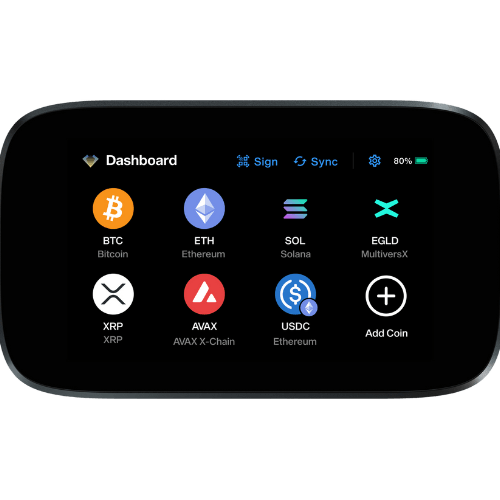
Where to buy Ngrave Zero?
Product details Ngrave Zero hardware wallet
| Price | 398 |
| Brand | Ngrave |
| Country | Belgium |
| Since | 2018 |
| PC/desktop | No, but it needs pc to update |
| Mobile | Android and iOS |
| Connect with | Air-gapped |
| Coins | 3.500+ |
| Battery | Yes |
| Screen | 4" Touchscreen |
| Included |
|
About Ngrave Zero hardware wallet
The Ngrave Zero, developed by a Belgian company, is a hardware wallet that guarantees maximum security. This wallet is completely air-gapped, meaning it does not make any connections to the internet or other devices via cable, Bluetooth, or NFC. All communication with your smartphone is done through QR codes, providing optimal protection for your crypto against hackers and malware. In addition to its robust security, the Ngrave Zero also offers a user-friendly experience thanks to its sturdy housing and large 4-inch touchscreen.
Who is the Ngrave Zero hardware wallet suitable for?
The Ngrave Zero is ideally suited for users with a higher budget and those seeking a premium hardware wallet that is both robust and feels substantial. Designed with mobile users in mind, it employs a unique method for securing the private key, known as the Perfect Key. This Perfect Key is then designed to be stored in the durable metal Ngrave Graphene. We strongly recommend purchasing these two components together to maximize the security and longevity of your private key storage.
Where to buy Ngrave Zero?
7. Ledger Trezor Safe 3 hardware wallet
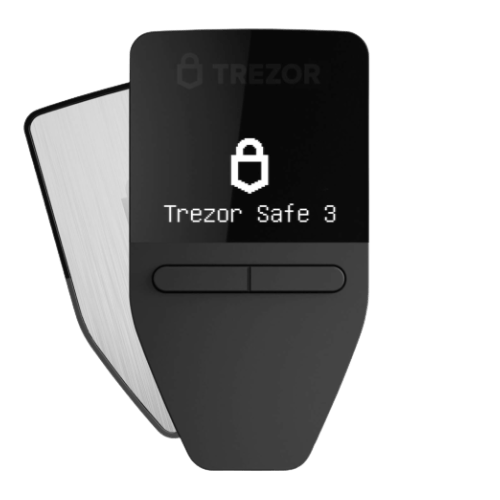
Where to buy Trezor Safe 3?
Product details Trezor Safe 3 hardware wallet
| Price | 49 |
| Brand | Trezor |
| Country | Czech Republic |
| Since | 2023 |
| PC/desktop | Windows, macOS and Linux |
| Mobile | Android |
| Connect with | Cable |
| Coins | 3.000+ |
| Battery | No |
| Screen | 0,96" Monochromatic screen |
| Included |
|
About Trezor Safe 3 hardware wallet
Trezor launched the Trezor Safe 3 in late 2023, marking their first new hardware wallet in years. A key innovation is its fully open-source Secure Element, a security chip, a feature also found in the later Trezor Safe 5. Paired with Trezor Suite software, it manages thousands of cryptocurrencies. While featuring a smaller screen and two-button navigation, its affordability makes the Trezor Safe 3 ideal for occasional users.
Who is the Trezor Safe 3 hardware wallet suitable for?
The Trezor Safe 3 is the perfect hardware wallet to start your crypto adventure. This budget-friendly wallet supports just as many coins as the Trezor Safe 5, but has a more compact screen without a touchscreen. Like its more expensive sibling, the Trezor Safe 3 is fully open-source, ensuring optimal transparency and security. Please note: this wallet is not compatible with iOS devices. The connection to your computer is via the included USB-C to USB-C cable.
Where to buy Trezor Safe 3?
8. Ledger Stax hardware wallet

Where to buy Ledger Stax?
Product details Ledger Stax hardware wallet
| Price | 399 |
| Brand | Ledger |
| Country | France |
| Since | 2024 |
| PC/desktop | Windows, macOS and Linux |
| Mobile | Android and iOS |
| Connect with | Cable or Bluetooth |
| Coins | 5.500+ |
| Battery | Yes |
| Screen | 3,7" E Ink touchscreen |
| Included |
|
Accessoires
About Ledger Stax hardware wallet
The Ledger Stax, Ledger's latest hardware wallet, distinguishes itself with its premium design and functionality, featuring a large touchscreen and wireless charging. It supports thousands of cryptocurrencies through Ledger Live and external applications, including staking capabilities for various coins. The Stax can be used both via Bluetooth with mobile devices and via USB-C with computers, and offers unique personalization by displaying names and NFTs on its E-ink screen. The name 'Stax' refers to the ability to stack multiple wallets, and also plays on the term 'stacking sats' from the Bitcoin community.
Who is the Ledger Stax hardware wallet suitable for?
The Ledger Stax is a premium hardware wallet that comes with a premium price. Beyond the essential secure crypto management features, the Stax distinguishes itself with unique additions. These include wireless charging and a curved E-ink display, which can show the owner's name and even be used to view NFTs. Ultimately, whether these features warrant the higher cost is a matter of personal preference.
Where to buy Ledger Stax?
9. BitBox02 hardware wallet

Where to buy BitBox02?
Product details BitBox02 hardware wallet
| Price | 149 |
| Brand | BitBox |
| Country | Switzerland |
| Since | 2019 |
| PC/desktop | Windows, macOS and Linux |
| Mobile | Android |
| Connect with | Cable |
| Coins | Depends on version (Bitcoin only vs Multi Edition) |
| Battery | No |
| Screen | 128 x 64 px white OLED |
| Included |
|
About BitBox02 hardware wallet
The BitBox02 hardware wallet offers two versions: the Multi Edition, supporting Bitcoin, Litecoin, Ethereum, and ERC-20 tokens, and the BTC-only Edition. The BTC-only version prioritizes security by focusing solely on Bitcoin, reducing the attack surface and the risk of bugs due to its smaller codebase. BitBox, a Swiss company with a long-standing presence, is known for its commitment to Bitcoin security and innovation, often leading in the implementation of new standards, such as their early adoption of Silent Payments.
Who is the BitBox02 hardware wallet suitable for?
The BitBox02 is particularly well-suited for individuals who prefer an open-source hardware wallet and do not use an iOS phone. Additionally, it offers a convenient and versatile backup solution for your private key by allowing backups to be made on an SD card, providing users with multiple options for securing their recovery information.
Where to buy BitBox02?
10. Blockstream Jade Plus hardware wallet

Where to buy Blockstream Jade Plus?
Product details Blockstream Jade Plus hardware wallet
| Price | 179,95 |
| Brand | Blockstream |
| Country | United States |
| Since | 2025 |
| PC/desktop | Windows, macOS and Linux |
| Mobile | Android and iOS |
| Connect with | Cable, Bluetooth, camera/QR codes and sd cards |
| Coins | Bitcoin and liquid assets |
| Battery | Yes |
| Screen | 1,9" LCD display |
| Included |
|
About Blockstream Jade Plus hardware wallet
The Blockstream Jade Plus is an advanced, open-source Bitcoin hardware wallet, designed for ultimate security and a user-friendly experience for both beginners and experienced users. The device offers unparalleled security through advanced encryption technologies and versatile connectivity options, including USB, Bluetooth, a camera for air-gapped workflows, and external storage for firmware updates and transaction signing, enabling users to manage their Bitcoin securely and flexibly.
Who is the Blockstream Jade Plus hardware wallet suitable for?
The Blockstream Jade Plus is the ideal hardware wallet for the Bitcoin maximalist because it offers uncompromising security and exclusive support for Bitcoin. This device empowers users to maintain absolute control over their Bitcoin holdings, providing a range of connectivity options like USB, Bluetooth, air-gapped transactions via camera, and external storage because it caters to the need for both convenience and maximum security in managing Bitcoin. For those who prioritize self-sovereignty and a Bitcoin-only focus, the Jade Plus is the perfect solution because it eliminates the complexities and risks associated with multi-asset wallets.
Where to buy Blockstream Jade Plus?
11. OneKey Pro hardware wallet

Where to buy OneKey Pro?
Product details OneKey Pro hardware wallet
| Price | 299,95 |
| Brand | OneKey |
| Country | Japan |
| Since | 2022 |
| PC/desktop | Windows, macOS and Linux |
| Mobile | Android and iOS |
| Connect with | Cable, Bluetooth and air-gapped |
| Coins | 5.000+ |
| Battery | Yes |
| Screen | 3,5" color touchscreen |
| Included |
|
About OneKey Pro hardware wallet
The OneKey Pro is a pocket-sized hardware wallet featuring a 3.5-inch touchscreen and top-tier EAL6+ security. It boasts four internationally certified EAL6+ secure chips, elevating hardware security to new heights. It supports air-gapped signing with a high-definition camera for QR code scanning, fingerprint unlocking, and wireless charging. Combined with the OneKey App, it empowers users to securely buy, swap, and grow their crypto holdings.
Who is the OneKey Pro hardware wallet suitable for?
The OneKey Pro hardware wallet caters to the discerning cryptocurrency user who prioritizes both security and a premium user experience. Its large, vibrant touchscreen and extensive multi-coin support make it perfect for those managing a diverse portfolio of digital assets. The air-gapped functionality, coupled with advanced security chips, appeals to individuals seeking the highest level of protection against online threats. While positioned in the higher price bracket, the OneKey Pro is a worthwhile investment for users who demand superior security, an intuitive interface, and the ability to confidently manage a broad range of cryptocurrencies.
Where to buy OneKey Pro?
Summary of the top 11 best hardware wallets.
What is a hardware wallet?
A hardware wallet is a device which you use to store the private keys of your public (receipt) addresses, securely and offline. This is important because only the people who have the private key can access the cryptos in the respective addresses.
This offers the advantage that you yourself manage your coins and that you don't have to store them with a central party, like an exchange. You are your own bank. Plenty of exchanges have been hacked in the past. A hot wallet (on a phone or PC which is always running) is also riskier than a hardware wallet (cold wallet). A hardware wallet largely operates offline and has a security chip.
What should I be mindful of?
You can evaluate hardware wallets based on a variety of factors. Some may be more relevant to you than others. Here are a few things to consider:
- How do you want to manage your coins (computer or phone)?
- Do you only want to store Bitcoin or other coins/tokens as well?
- Do you want to be able to stake your coins/tokens?
- Would you prefer a larger screen with a touchscreen?
Important: store and secure your backup
When setting up your hardware wallet, you will see a seed phrase once. This is usually a list of 12 to 24 words that you must store correctly and in the right order. This allows you to always regain access to your wallet. It is extremely important that you store it securely, as no one else can give you access to your wallet except you. To store the seed phrase securely, we recommend purchasing a SOLIDHODL.
Tangem Wallet


★★★★★ 9.6
- ✅ iOS and Android
- ✅ NFC wallet
- ✅ User-friendly
Ledger Flex


★★★★★ 9.6
- ✅ Touchscreen
- ✅ Cable + Bluetooth
- ✅ Incl. Recovery Key
Jade Plus


★★★★★ 8.5
- ✅ Bitcoin-only
- ✅ Open-source
- ✅ USB, Bluetooth, camera


 9,3 / 10 - 4.136 reviews
9,3 / 10 - 4.136 reviews












 WhatsApp
WhatsApp
 Email
Email